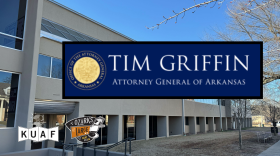Matthew Moore: We begin today with artificial intelligence. NorthWest Arkansas Community College is helping people with almost no real knowledge of AI, and people with a significant amount of understanding. The community workshops open to the public stretch from beginner to advanced coding.
Chris Lynch, the interim executive director of workforce development at NWACC, says the autumn schedule began last week. He told Ozarks at Large’s Kyle Kellams that the series began with just one all-encompassing level of workshops.
Chris Lynch: And I very quickly realized that there are a lot of different experiences, a lot of different people who use AI in different ways and at different levels. So I would have people who had never even logged into a chatbot, and then I would also in the same class have full-stack developers who need a lot more intensive AI work in the development space. And so I ran that for about six months, and then I decided to bust it up into different levels of AI to provide that.
My plan for that series is to provide a general, beginner-friendly class, because some people still are a little bit anxious in using the technology. And then step it up a little bit to an intermediate-level class where we design agents specific to a business use. And then, of course, I want to move that into an advanced artificial intelligence for very specific, high-level and complex use cases, such as software development. And I want to move that into various different areas such as healthcare. I think healthcare will probably be one of the next ones I develop.
As part of that national consortium, we have access to advanced manufacturing artificial intelligence learning and professional development. So that will probably be another pretty quick addition to the workshop series.
Kyle Kellams: The first beginner level of the fall took place just a few days ago. As you and I are talking, where do you start with a beginning class with AI? Say it’s people that come in and like, yeah, we know it’s changing things, we know we probably should know more about this, but we haven’t interacted. How do you begin?
Chris Lynch: So I start off the class with a little bit of history on the development of artificial intelligence, which is not really a new science. It’s new to the public, maybe, but this idea has been around for a long, long time. And just like any technology, it starts with the mathematics, which was in place in the early 1900s. We waited on the hardware to get here, to be able to do what we can do with AI technologies now.
We talk a little bit about ethics because that is a big topic in artificial intelligence—to know that your data is correct and non-biased, and to use that data properly, to use the tools in an ethical manner. And then we dig right in. And I think one of the best ways for people to learn, of course, is hands-on.
So we set up certain little use cases for artificial intelligence, like write an email to your boss explaining why you’re going to miss this deadline. And then I show them some ways to manipulate the prompt for that AI to get the tone and the style of letter that you’re looking for. And in the case of an email, then we look at imagery—making imagery with artificial intelligence, making video with artificial intelligence. We delve a little bit into prompt optimization, which is also another workshop that I’ve added to the series by request of some of our clients.
And then we move into some more specific use cases in writing software. But I keep it very, very simple for the first class. We just make a very easy, simple HTML web page and just play around with how to prompt the AI to do that. We look at how to use it for just some general data use cases. So it’s a pretty wide spread, and I try to hit anything that somebody might need that AI technology to use in their day-to-day work.
Kyle Kellams: Did you by any chance kind of take an informal survey of why people were in that class, for the beginner’s class?
Chris Lynch: Well, I do that a little more informal in the class. I kind of just ask everybody, what are you here for? And it is usually a wide range. Some folks from marketing, they’ll want specific things in marketing, such as how to generate imagery. And that always leads to, is this a copyright issue or how do artists get paid from this?
And then there are people that are just there to learn. Sometimes I’ll have even folks who are retired but are very interested in this technology and want to stay up on technology and learn what’s going on.
Kyle Kellams: There was an editorial in a statewide publication not too long ago that basically kind of said for small business owners, if you don’t know AI right now, the clock is ticking. Your business is going to be in jeopardy because your competitors are doing this. How important is it for, I guess, just about anybody who’s in a workforce to know more about AI in 2025?
Chris Lynch: It is a very, very quick and easy way to make your business run more efficiently in almost any business that you’re in. Even to the point where, especially if you’re analyzing data—which is obviously very useful in business and particularly in northwest Arkansas—it’s just a way to…it’s, I look at it like a tool.
And if you’re using a hammer to put nails in a roof, you might be more efficient to use a nail gun. But you may still need to go back to that hammer. So I feel like it’s a tool that is great for the toolkit of any business.
And of course, our bigger businesses are really jumping on the AI bandwagon and ramping up their hardware, ramping up their learning for their employees. And I’ve had several small businesses come into the workshop. They’re looking to use it for things like writing emails, maybe interacting with their customers with a chatbot, definitely analyzing data. And then there’s also just the fun aspect of just playing around with it and having fun.
Kyle Kellams: I’ve smashed my thumb with a hammer before. It hurt. I invented new swear words, but it got better. The nail gun’s even more intimidating. You’ve got to know what you’re dealing with, right? There’s a responsibility to understand how it works and the safety issues.
Chris Lynch: Absolutely. And I like your analogy. If you can use it, it’s more efficient. But it also has some drawbacks and some risks. And one of those risks is your data privacy.
So I never ask our workshop participants to bring in their own data. We just use random data that I invent, or I ask the chatbot to invent, or we use football statistics or music statistics—something that’s public domain. But there are some inherent risks in using that technology, especially if you automate it and don’t watch it.
There always, in my opinion—for now at least—needs to be a human in the loop. A human to check over the output of the AI and make sure that it’s safe, make sure that it’s correct and useful to that business.
Kyle Kellams: All right, so how do people, whichever level they feel comfortable with, that they think they could slot into—how do they become part of this?
Chris Lynch: You can sign up on our website. It’s training.nwacc.edu. You can sign up for our workshop series.
We also have a certificate of proficiency at NWACC in artificial intelligence that just started this fall. It’s regular classes. It’s about an 18-hour certificate that includes data science, some technical reading and writing, and then a survey of AI. And, like I said, a very important class—ethics of AI and knowing what you’re getting out of it is important. So that’s a different approach if someone wanted to go the traditional college program, credit-for-credit program route.
The AI in the workplace workshops will continue to evolve as I add more technology to it. And really, I love to let our business and industry partners guide us in what we need to provide for them.
Kyle Kellams: Also, NorthWest Arkansas Community College has been selected to participate in the National Applied Artificial Intelligence Consortium, the NA-AIC. What does that mean?
Chris Lynch: So this is a nationwide consortium. There are 12 other colleges involved this year. And they’re going to help us expand our programs. They’re going to help us by providing professional development, access to tools such as the Google AI learning series, some other tools, and Microsoft Copilot. They have an advanced manufacturing professional development series. So they’re going to support us and our other colleges as we develop these programs and expand them.
Their goal really is to get to an AAS degree in artificial intelligence. So they’re going to show us the ways that other schools have done this and got to that level of learning.
Kyle Kellams: Chris, you are in a unique position because you are, as the interim executive director of workforce development, talking to people, getting them ready for the workforce or helping them make the workforce more efficient. At the same time, the workforce seems to be changing hourly and you’ve got to learn yourself. What’s it like for you as someone who has to learn, maybe on the cusp, on the cutting edge, so you can inform those of us who aren’t learning at that level?
Chris Lynch: Well, I will say it’s work. Every day, something new with artificial intelligence. So one of the things I do is prior to every workshop, I always update, look at what’s new, try to provide the newest and most up-to-date models for our participants and let them use those.
And another thing that really, really helps us is our interaction with business and industry. We convene regularly with our business and industry partners. I have a lot of great partners in the area who kind of let me know what’s coming down the pipe. As you know, institutions and government agencies are a little bit slower than the business and industry world. So I rely on them to let me know what new technologies they’re using and what’s coming down the pipe.
I try to get out ahead of it, see what’s new. A little bit of maybe soothsaying, if you will. If I kind of feel like this is going to come down the pipe and be a useful application of these tools, then I’ll try to add that as well.
Kyle Kellams: Chris Lynch is the interim executive director of workforce development at NorthWest Arkansas Community College. He talked about NWACC’s community AI workshops with me via Zoom last week.
Ozarks at Large transcripts are created on a rush deadline. Copy editors utilize AI tools to review work. KUAF does not publish content created by AI. Please reach out to kuafinfo@uark.edu to report an issue. The audio version is the authoritative record of KUAF programming.








